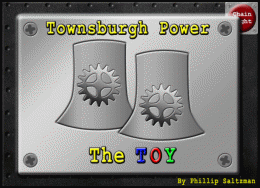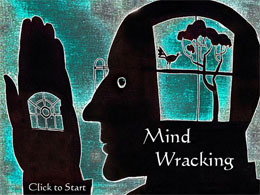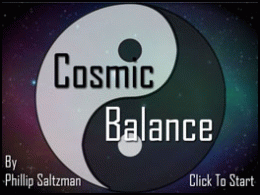Demos
In my third semester at the Entertainment Technology Center, I had a chance to work on the Experimental Gameplay Project, where I made a total of ten game prototypes. It's the nature of prototyping that a lot what you try just doesn't work, but every once in a while you stumble on a good idea. These demos are the good ideas that came out of the process.
A lot of people have asked how we made these games. I used simple OpenGL with a fixed 2D camera. The games were written in C++ and compiled with Microsoft Visual Studio 2005. To make things easier, several libraries were used. OpenGLUT was used for creating the window and input/output, OpenIL was used to load textures, FMOD was used for sound, and FreeType was used for dynamic text. A common framework was built up over the course of the semester to make development easier. Besides that, all other art, code, and sound were built from the ground up each week.
Townsburgh Power The Toy (exe) (zip)

This demo is a toy based on my Townsburgh Power game, which, like all Experimental Gameplay games, was made in a week. You can get the original here. The game showed promise, but had both game design and technical issues. Fortunately, it was merely a prototype and if a prototype is successful it can be improved. With Townsburgh Power The Toy I have focused on polishing the chain system since it was part of the original version that showed the most promise.
The chain system is based on a Verlet-based constraint satisfaction system outlined in this article. You can find some sample source code from the project here.
Mind-Wracking (exe) (zip)

Mind-Wracking was my best Experimental Gameplay Game from a game design perspective. On its face it looks like a simple Tetris clone, but it is far deeper than that. It is a puzzle game with two parts. The first part is figuring out how to use Tetris shapes to make a path from the beginning to the end of the maze. The second part is to figure out how to manage your resources so you don't run out later.
A lot of people have come to me with ideas of things that could be added, including different shapes, timers, scores, power-ups, and a dynamic maze. These all could work, and maybe I'll add them someday, but the game stands up very well on its own without them.
Cosmic Balance (exe) (zip)

This was my final game for the Experimental Gameplay Project, based on the theme of contrast. It is best described by this comment from the Experimental Gameplay page: "Cosmic Balance is a great coffee break game. Once you figure out what to do (which is quite trivial) it's an easy and quick game. Gameplay is smooth and intuitive, and gets your attention for the whole 45 seconds of play. Really nice for a break :)"
